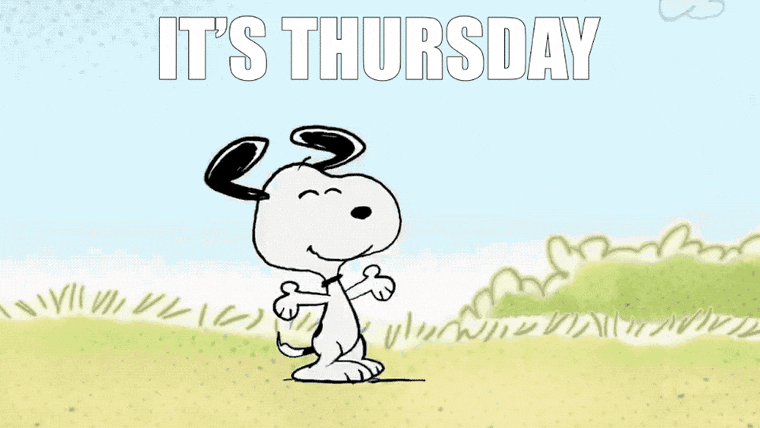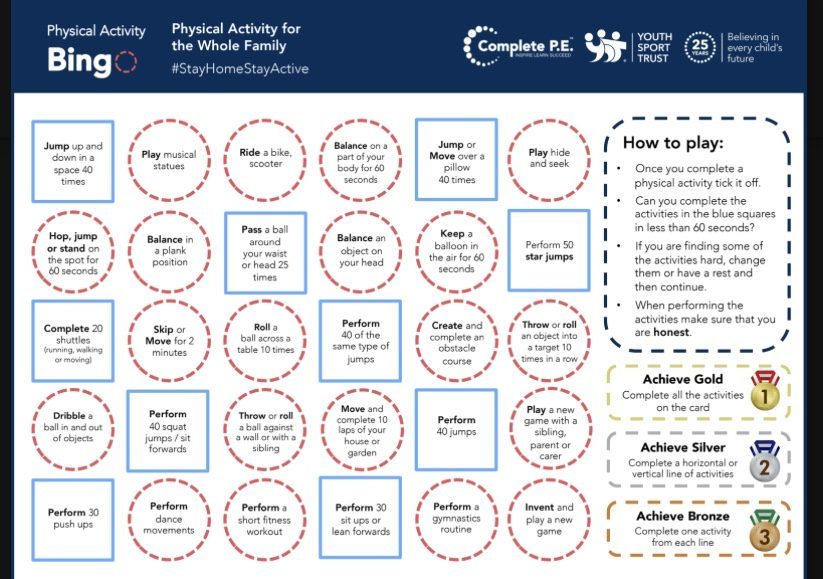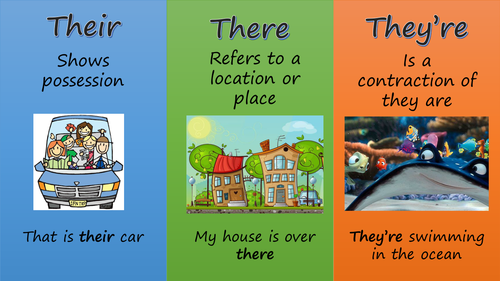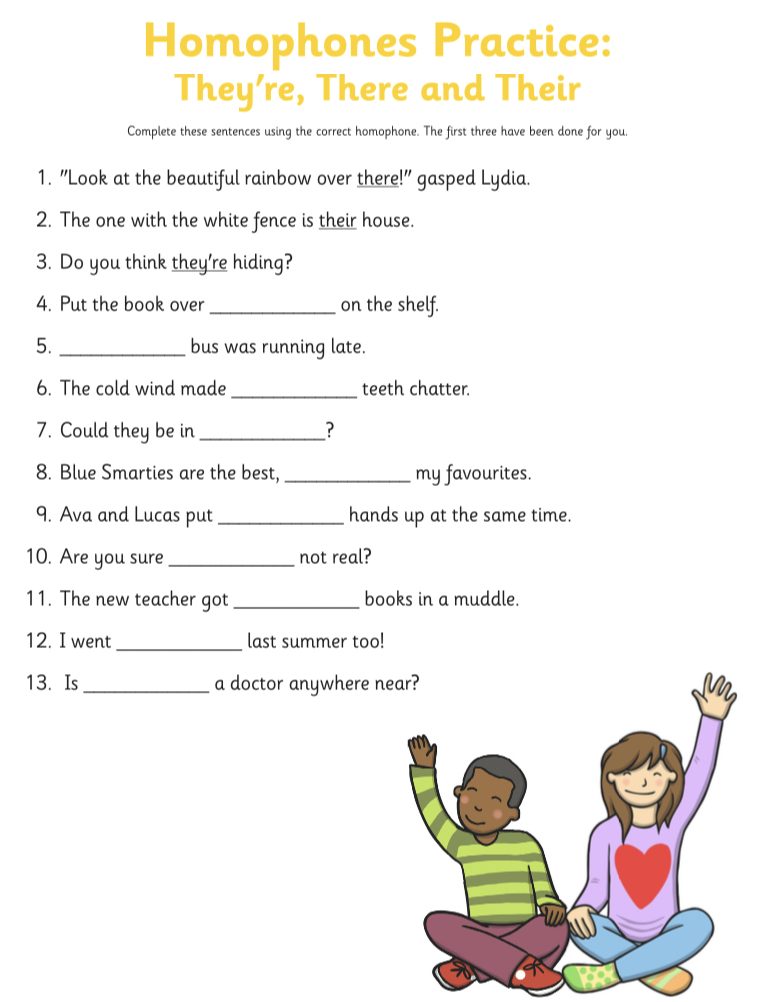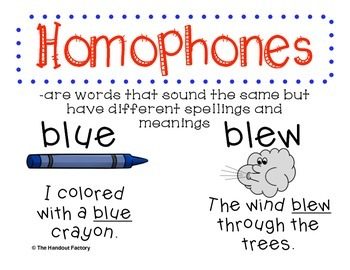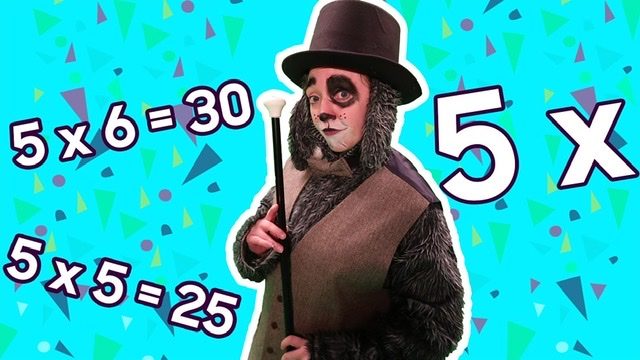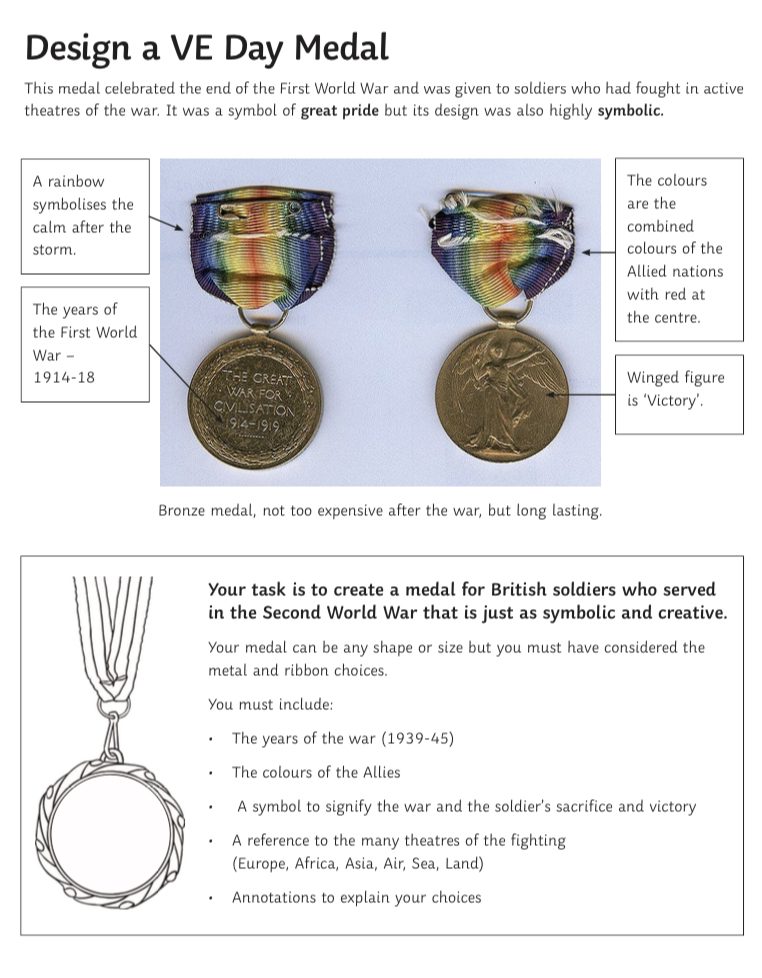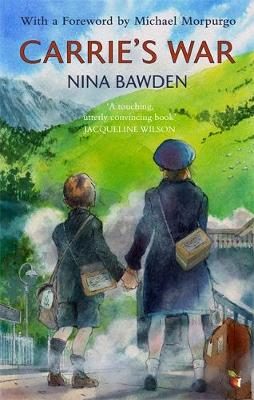Good morning everyone! Wow what a lovely day it was yesterday, I hope you all had some fun in the sun! ☀️
How many activities can you complete in P.E. bingo? I wonder if any of you will manage to achieve the gold ranking! 🏅
Literacy:
Today for our literacy task we will be looking at homophones. Homophones are words that sound the same but are spelt differently and have different meanings. ‘Their’, ‘they’re’ and ‘there’ are homophones that often confuse people.
‘Their’ means it belongs to them, eg “I ate their sweets.”
‘They’re’ is short for ‘they are‘ eg “They are going to be cross.”
‘There’ refers to a place, eg “I’m going to hide over there.”
Thursday 7th May
Homophones
I can select the appropriate homophone.
Warm Up:
Let’s watch a video clip to remind us how we use there, their and they’re. https://www.bbc.co.uk/bitesize/topics/zqhpk2p/articles/z3cxrwx
Got it? Have some practise: https://www.youtube.com/watch?v=ZwE2oV9QXL8
Main Task:
Activity 1: Which Word?
Choose the correct homophone to complete each sentence.
Activity 2: Your Turn!
Write 3 sentences using there, their and they’re (or write one sentence that has all three in it such as ‘They’re playing football with their ball over there by the fence’).
Activity 3: Correct the Mistake
Some of the sentences below have the correct use of there, their and they’re. However, some of the sentences have not. In your jotters correct the incorrect sentences.
- This is their boat.
- I think that their really nice kids.
- The robot is over they’re.
- There is my cat!
- Will you go their?
- I think that there funny.
- Their hungry.
- They’re going to play with us.
Extension:
Remember homophones are two words that sound the same, but they are spelt differently and have different meanings. Another example of homophones is blue (The cat’s collar is blue) and blew (The wind blew the tree over).
Challenge: How many other homophones can you think of? Create a poster which illustrates the meanings of the two words. For example:
Maths
Warm Up: Mental Maths
- Write down any 3 odd numbers that add up to 19
- What is 7 multiplied by 6?
- What is double 17?
- What is the next even number after 52?
- What is 100 subtract 23?
- Multiply 45 by 100.
- What is 2,248 rounded to the nearest 1,000?
- What is 10p less than £10?
- What is 7,836 in words?
- I think of a number, then subtract 8. The answer is 23. What was my number?
- What is the next number in the sequence: 12, 21, 30, 39, _______
- What is the difference between 31 and 47?
- What is 36 shared between 6?
- How many 20p coins make £3?
- Today is Thursday 7th May. What will be the date next Friday?
- Calculate 17 + 5 + 23
Main Task: Five Times Table
07.05.20 Multiplying by 5
I can build up my knowledge of table facts.
Activity 1: Supermovers
Let’s revise our knowledge of the five times table today. Start by joining in to the Supermovers song! https://www.bbc.co.uk/teach/supermovers/ks1-maths-the-5-times-table/zhbm47h
Activity 2: Missing Number
| 1. 5 x 10 = _____ | 13. _______ x 5 = 10 |
| 2. 5 x 4 = _____ | 14. _____ x 5 = 5 |
| 3. 7 x 5 = _____ | 15. 5 x _____ = 0 |
| 4. 2 x 5 = _____ | 16. _____ x 5 = 30 |
| 5. 5 x 5 = _____ | 17. _____ x 5 = 15 |
| 6. 1 x 5 = _____ | 18. _____ x 5 = 45 |
| 7. 5 x 9 = _____ | 19. 5 x _____ = 25 |
| 8. 5 x 8 = _____ | 20. 5 x _____ = 55 |
| 9. 3 x 5 = _____ | 21. _____ x 5 = 40 |
| 10. 0 x 5 = _____ | 22. 5 x _____ = 20 |
| 11. 6 x 5 = _____ | 23. _____ x 5 = 60 |
| 12. 12 x 5 = _____ | 24. _____ x 5 = 35 |
Activity 3: Factor Pairs
- _____ x _____ = 20
- _____ x _____ = 40
- _____ x _____ = 55
- _____ x _____ = 10
- _____ x _____ = 5
- _____ x _____ = 35
- _____ x _____ = 50
- _____ x _____ = 60
- _____ x _____ = 30
- _____ x _____ = 15
- _____ x _____ = 45
- _____ x _____ = 25
Activity 4: Sequences
Complete the sequences in your jotters.
- 10, 15, 20, ____, ____, 35
- 35, ____, ____, 50, 55
- ____, 5, ____, 15
- 45, 50, ____, ____
Traffic Light today’s work and leave a comment to say how you found multiplying by 5 today. 🚦
Extension:
There are lots of five times table activities on the following website: https://www.timestables.co.uk/5-times-table.html (the games work on tablets and mobile phones too!).
Alternatively, work on your speed and accuracy on Hit The Button: https://www.topmarks.co.uk/maths-games/hit-the-button
Friday and Monday are holidays, so I won’t be posting any activities for you. However, I am going to put some extra V.E. day related activities that you can do if you wish.
If you would like to learn more about the Second World War you could read this Newsround article: https://www.bbc.co.uk/newsround/48201749
Have you ever heard of Morse Code? Morse Code is a system of dots, dashes, and spaces which are used to represent numbers, punctuation, and letters of the alphabet. It was used both as a code and a way to communicate without the need to use letters. Can you crack the code and decipher the message? You could also write a letter for someone in your house and see if they can decipher it!
Design a medal for British soldiers who served in the Second World War. Here is your design brief:
Remember the comprehension activity that we did on Carrie’s War by Nana Bawden? You can listen to the audiobook here: https://www.bbc.co.uk/teach/school-radio/english-ks1–ks2-episode1-carries-war/zm77gwx
Do you have trouble imagining what it was like during that time? There are some clips and interviews on the BBC School Radio site which are really interesting: https://www.bbc.co.uk/teach/school-radio/history-ks2-world-war-2-clips-index/zjc8cqt
Enjoy your long weekend, I’ll be back with you all on Tuesday!
Miss Donaldson 🥳
